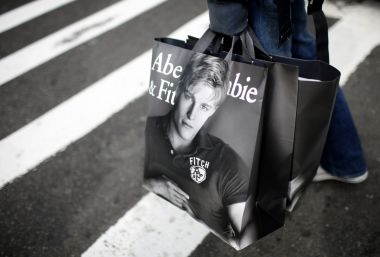Abercrombie and the hijab: Why Christians should care about the rights of Muslims

It came as a surprise to no one when clothing chain Abercrombie & Fitch denied a job to yet another young woman who didn't quite fit their specific – and probably very long – list of requirements. Few pass the perfectly-groomed 'preppy college student that just likes hanging out with her friends, playing frisbee and eating ice cream (but never actually eating ice cream because it's too fattening)' look that female employees sport. And it's no easier for the boys, either; the Adonis body type doesn't come naturally (or so I'm told). Your actual student boy body is more likely to be pale and sallow from three years of not seeing daylight with a physique built on chips and beer.
It's not just the actual physicality of staff that is scrutinised – Abercrombie used to specify that "attractiveness" was a factor when hiring, but in April said it had changed this practice – but the lengths employees must go to to fit the image the company has created. Documents obtained by Buzzfeed in 2013 revealed a rigid dresscode believed to be followed by all front-of-house staff. Skinny jeans had to be turned up by exactly 1.25 inches, belts styled in a particular fashion and the top three buttons of a denim shirt undone. In a fascinating display of micromanagement, instructions for how to push up shirt sleeves in the 'correct' way were also given.
"No associate is permitted to wear any extreme hair styles or hair colour," the 'Hairstyle sketchbook' dictated. "While we respect your individuality, it is important that we maintain a consistent level of dress and grooming that represents what people expect from the Abercrombie & Fitch brand."
To give the company some credit, it said it was changing policy to allow sales staff to be "more individualistic" following the departure of its 70-year-old CEO Mike Jeffries in December. He came under fire in 2006 after telling a reporter from Salon that the brand "absolutely" excluded those that didn't quite fit its image. "In every school there are the cool and popular kids, and then there are the not-so-cool kids. Candidly, we go after the cool kids," he said. "A lot of people don't belong, and they can't belong." It's no wonder that Abercrombie appears to have distanced itself from Jeffries' attitude since his retirement. It also changed the title of its store associates from "model" to "brand representative" and said it was ditching "sexualised" images printed on its marketing material and shopping bags.
But when Samantha Elauf was denied a sales job at a store in Oklahoma, it wasn't because she forgot to unbutton her shirt, or didn't have quite the right haircut, but because she was sporting a hijab. As a Muslim, she chose to wear a headscarf to her interview, and was rejected under Abercrombie's staff "look policy". The company said that the scarf didn't fit the dress code, which calls for a "classic East Coast collegiate style" and rated her one out of three for "appearance and sense of style".
She has just won a landmark case in the Supreme Court, after suing Abercrombie for unlawful discrimination. "Observance of my faith should not have prevented me from getting a job," Elauf said in a statement issued by the US Equal Employment Opportunity Commission (EEOC) on Monday.
"I am glad that I stood up for my rights, and happy that the EEOC was there for me and took my complaint to the courts."
It was an unprecedented victory, but Elauf's case is more than just a win for those who don't fit the Abercrombie stereotype – it's a triumph for religious freedom. Her situation speaks of the wider context of the way Muslims are perceived in our culture – that they are outsiders, different, and extreme – and if someone refuses to remove their hijab they're taking their religion too seriously, and by default must be dangerous. It's a problematic narrative, and one that followers of Islam deal with daily in the West.
Christians need to be speaking out about it; not just because it's a faith issue, but because it's about human dignity. As people who heed the call of Isaiah 58 to pursue justice and stand up for the oppressed, we should absolutely be backing the right for Muslims to express their faith, and not simply because we expect the same priviliges. It's time we started caring, and actually doing something about it. If we don't seek righteousness; who will?











